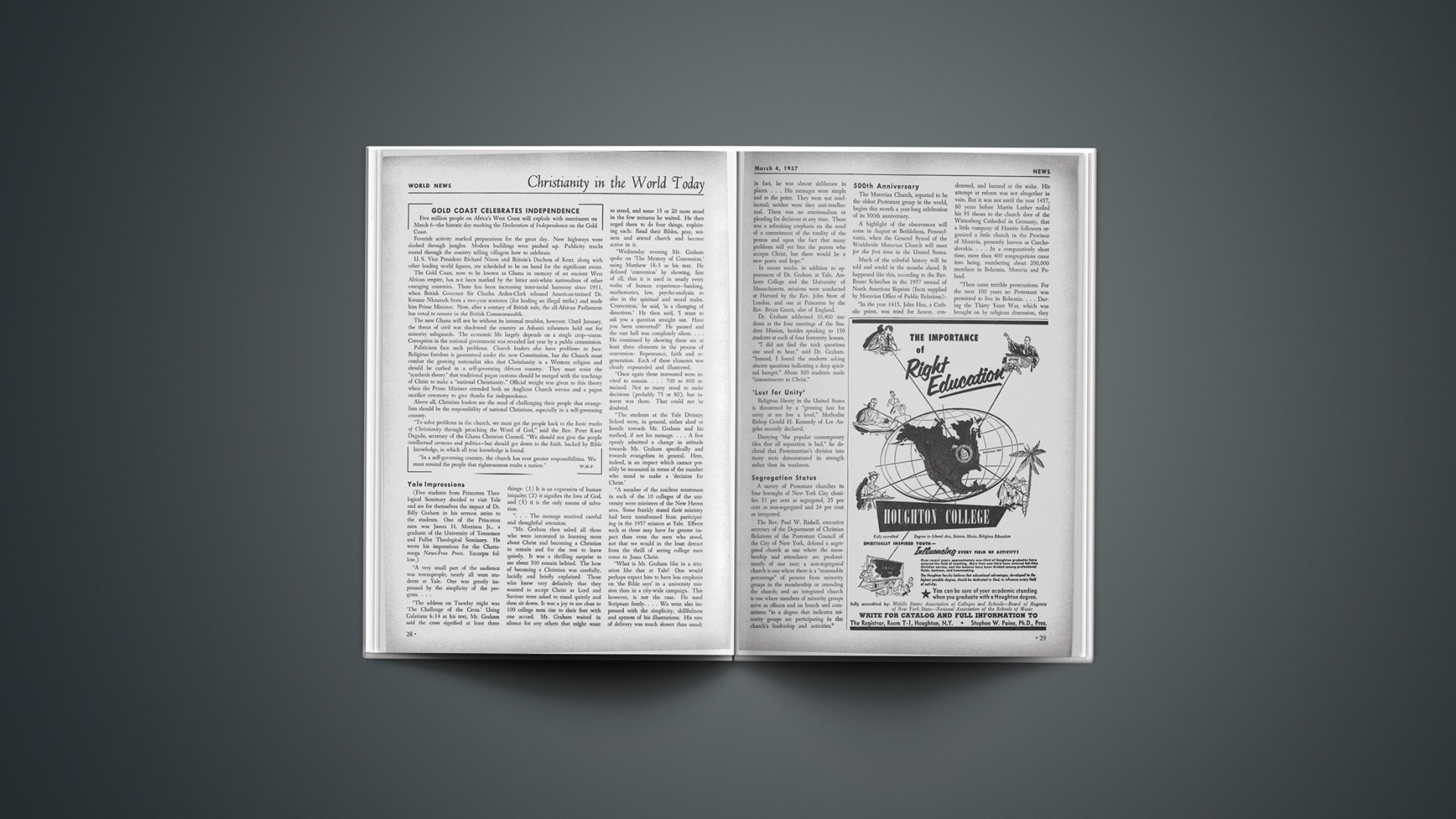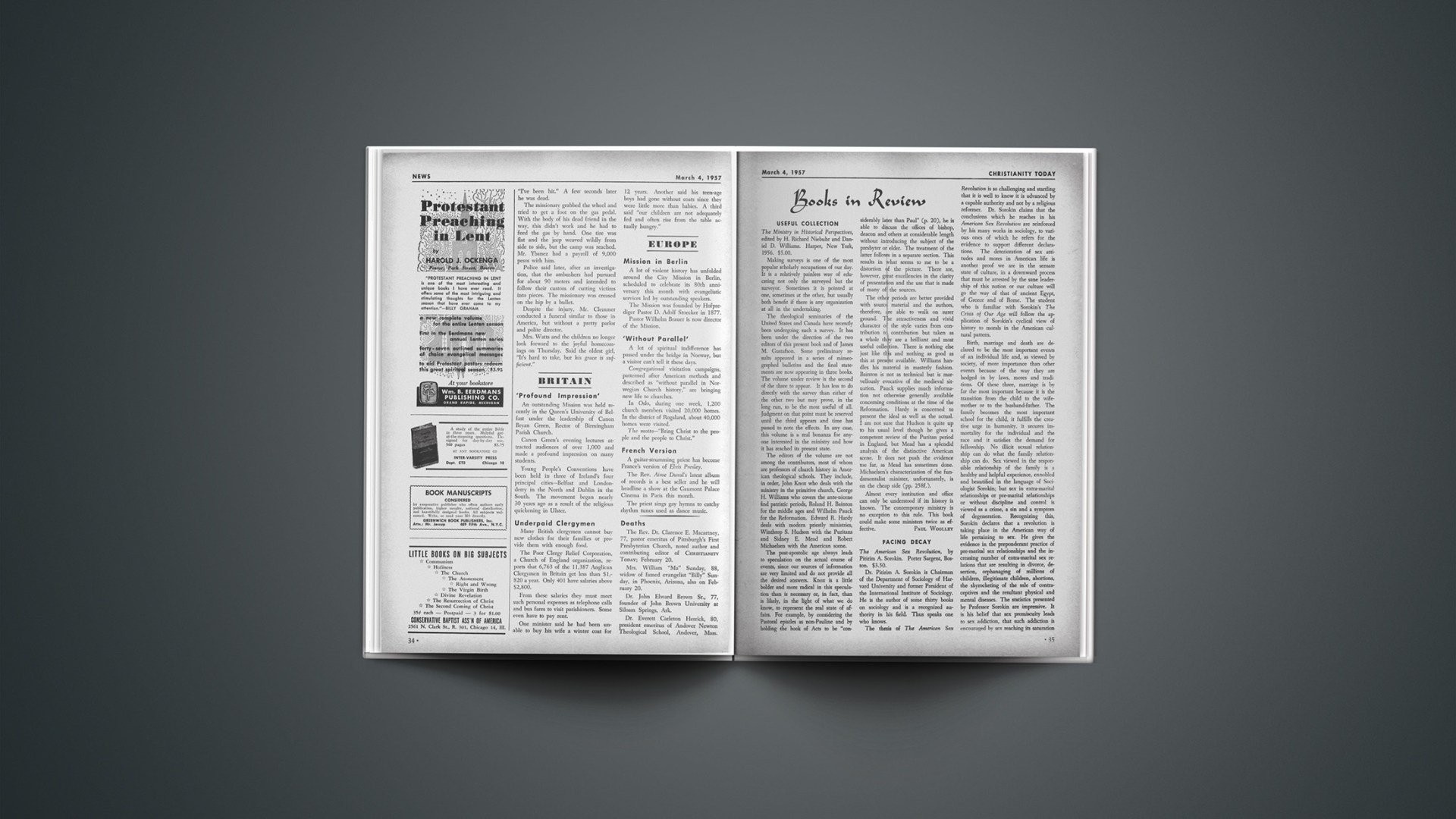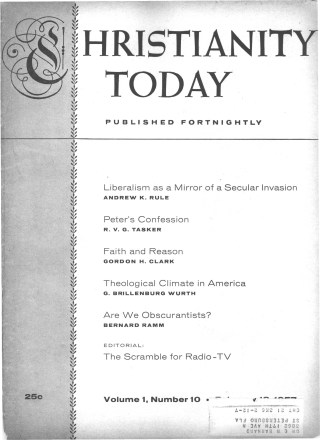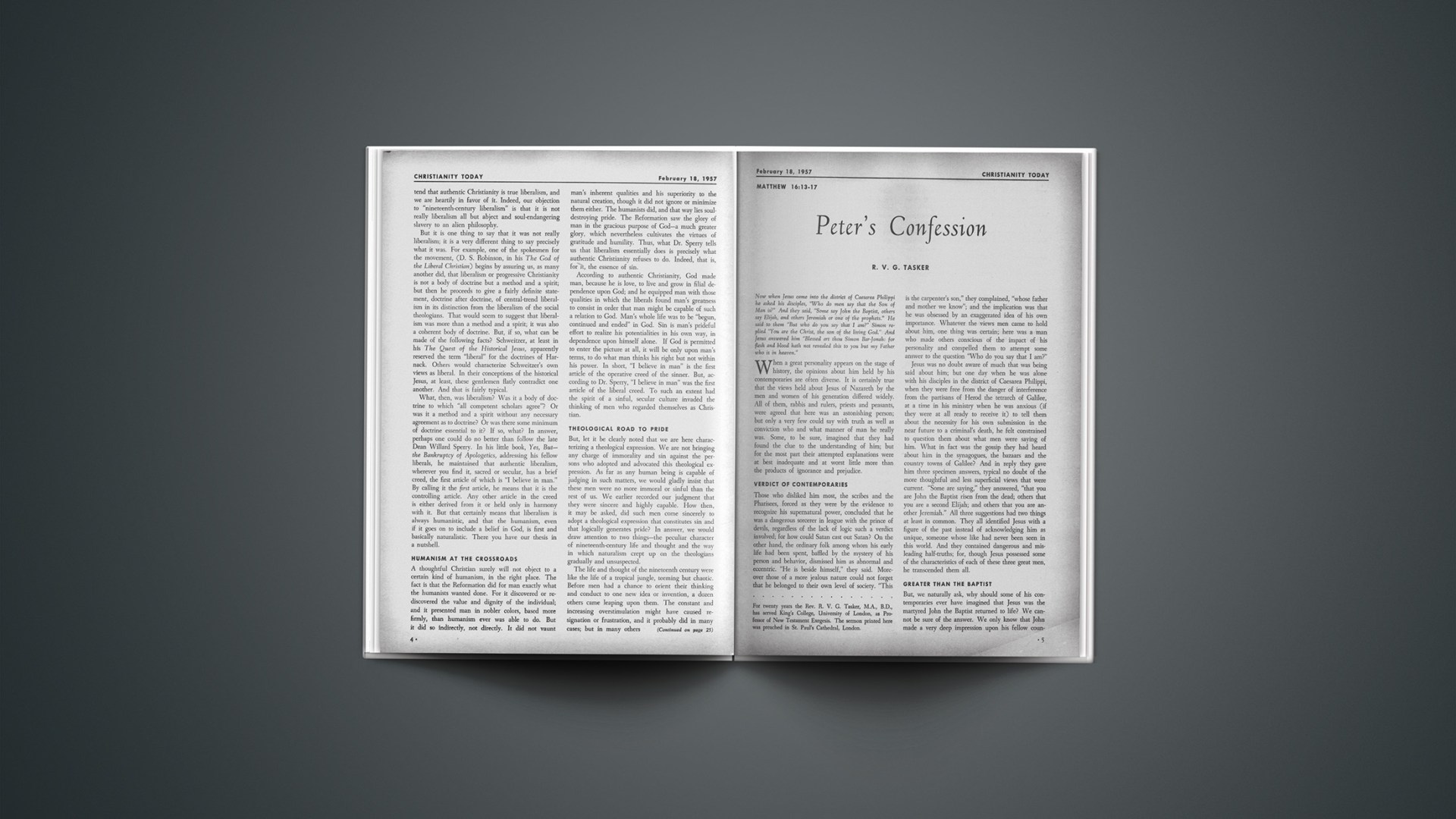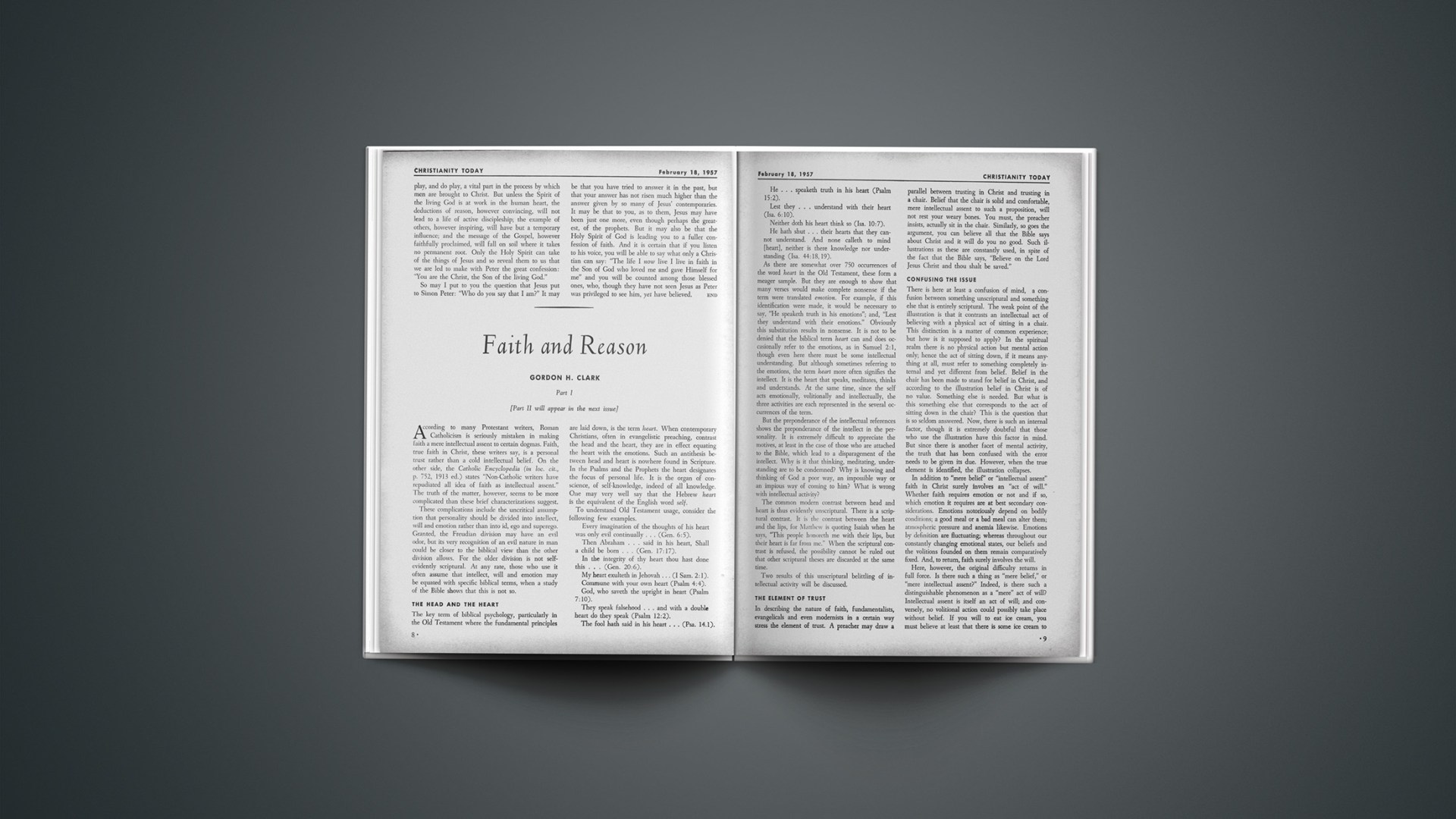On Meeting Changing Issues
A clear and effective witness for Christ in the name of evangelical Christianity will evidence a number of things. It will, of course, largely be positive and constructive rather than negative and destructive. For we have something to offer as well as something to protect and defend.
But even when evangelical Christianity witnesses positively and constructively, it will ever be conscious of the clamoring voices of competing theologies. And its witness will reflect the fact that it realizes it has competitors for the hearts of men. Evangelical Christianity will, therefore, be wisely apologetic. It will often be aggressive. And it will remain on guard against attack. To do all this and win converts in a revolutionary world is not easy. It requires the scriptural wisdom of serpents—and more.
But this wisdom has not always been evident in the witness of evangelical Christianity. There have been times when we lost more friends than we won. And we have not always been granted even that measure of civilized respect which our competitors seem willing to accord each other in the world of scholarship and learning. Too often our best reception has been an amused indulgence like that which a sophisticated city-slicker might grant his country cousin gawking at his first sight of an escalator. When evangelical Christianity has been given a hearing it has been an audience like that which the bored directors of a large corporation might grant some small stockholder who has claimed his legal prerogative of speaking at the annual board meeting.
Now we are not altogether blameless for the lack of respect which we have been accorded in many circles. For one thing, we have been a little aloof ourselves. We often have drawn our dignity about us like a garment and, in the exercise of our calling, we have stalked ahead heedless of the competing clamor like a proud great Dane frostily ignoring the yapping of mongrel terriers at his heels. But with even more embarrassing consequences, we have occasionally undertaken to do battle for our honor, without first making sure we were meeting our opponents on even terms. We have jousted with weapons unsuited to the style of combat, or we have made ourselves a spectacle by undertaking to do battle against opponents that were not even there. And we have been justly received with the regard due a Don Quixote.
Evangelical Christianity represents, generally speaking, theological stability. Our competitors, on the other hand, are noted for their adaptability and changeableness. Most of them seldom stand for the same essentials for long. As a matter of fact, a principal plank in their theological platforms is their theory of the impermanence of theological systems. The overall problem which results from this difference is that we, who expect an issue to stand still until it is resolved, must adapt our witness to an opposition for whom issues are seldom long the same, with the often disastrous consequences mentioned above.
Now the positive witness of evangelical Christianity to the Truth of God must always remain essentially the same, of course, for the Gospel is eternal in its verities. But it must also adapt itself to the contemporary situation in a manner suited to the occasion. That is, the negative aspects of that positive witness must change with the prevailing nature of the conflict. That aspect of our witness which meets conflicting views must always be shifting and adjusting to meet new and changing ideas: for human schemes and interpretations change with the prevailing winds. We are always in danger of assuming that because our conclusions are permanent, those of our competitors are likewise permanent.
Nor can we afford to treat the opposition with the unconcern which we think his views often deserve, defining the issue on our own terms in order to keep them more easily within reach. For if it is our purpose to speak convincingly to those who disagree with us, we must speak to their understanding of the problem, not to ours.
Thus we are always in danger of being denied a hearing, not only because the human heart is sinful, but also because we may be exercised about something which the other side does not recognize as an issue or no longer considers an issue, having modified its views or passed on to something else. This is a real problem, even though we may rightly recognize in the new issue or viewpoint the essential fallacies of the old.
So the lack of respect with which the evangelical Christian is often met may be due to his failure or disinclination to recognize and to keep abreast of the world on the other side of the fence. “Progressive” theologies can differ from each other widely, without losing their fundamental regard for each other. But the evangelical is met with contempt. Recognizing other reasons, we are also convinced that a part of the reason is that the evangelical often does not command the respect of his opponents by speaking coherently to the point.
But what of specific examples? There are many. Take the issue of “liberalism,” for one. Liberalism, in some respects, is a dead issue. Most informed “liberals,” as a matter of fact, no longer consider themselves “liberals.” They point to the fact that the former optimistic view of the nature of man, of the capacity of man for self-improvement and of an inevitable utopia, have been surrendered by most serious thinkers. They speak of “liberals” with the zeal of an evangelical, for their theology has returned to a “new” orthodoxy, to a new “realism.” Those theologians who once preached the innate goodness of man now affirm the reality of original sin. Those who once denied to man any savior but himself now proclaim our need to walk with the Living Christ. And those who stopped with some vague affirmation of life after death now declare that only the Resurrection can adequately explain God’s sovereignty over death.
This does not mean that the liberal has turned orthodox. Not at all. It simply means that the issues have changed. Now the question is: What does “original” mean? And “living”? And the “resurrection”? The unbeliever is still an unbeliever. But the evangelical who continues to blast all “liberals” with the same fervent heat as of yore stands to lose his audience except for those who, like himself, have failed to perceive the shifting emphasis of the opposition.
Of course this brings up the question of terminology, which is always a difficult one. The proper terms can help or defeat a campaign. But in this field the opposition seems always to have the upper hand. His language is respectable. Ours is usually outdated. “Heretic” is now a word in universal ill repute. (“Fundamentalist” has become a word of reproach and many resent the snide implications that have become associated with a term which once signified courage and integrity.) “Modernists” was badly chosen in the beginning, but is still half-heartedly used. Unfortunately, it implies something intrinsically bad about the word “modern,” which is wholly respectable in other usage. The word “progressive” may be a good one and recent political connections have given it the flavor of radicalism and reactionism—to coin one. “Radical theology” has a very satisfactory sound. Perhaps it will do.
But there is another area which comes to mind, in which modern realistic (pardon us, radical) theology and evangelical Christianity fail to meet on fair terms. This is the area of the social application of religion, and here it is not a matter of terminology. It seems to be a matter of interest. The opposition has almost made good its claim to exclusive jurisdiction within the area of social concern. He has well-nigh convinced the world that love of neighbor in a true fellowship of reconciliation is found in him alone. The evangelical, for whom “God was in Christ, reconciling the world unto himself” means the same thing, has not been able—or has not cared—to translate his theology into down-to-earth, practical Christian ethics. And the radical triumphantly carries the field.
Our faith has historically been an informed one as well as a reformed one. If we are to have a maximum effect for Christ in the world, our witness must be intelligently informed about competing theologies as well as about its own. And it must get down to earth in the marketplace and at the crossroads of life.
Spiritual-Moral Unity Wanes In United Nations
A new form of world power politics is finding its forum within the councils of the United Nations, and its implications for international morality are grave. For several generations the so-called “great powers” exercised their will through imperialistic and colonial policies. Where this was enlightened and constructive it unquestionably served a useful purpose, developing backward peoples to the point where personal expression and self-determination made policies of exploitation impossible.
But now, using the United Nations as both a forum and a fulcrum, the smaller nations have themselves developed a form of power politics that threatens to project future international relationships on an entirely new concept. The Afro-Asian bloc now dominates the United Nations under the leadership of neutralist India. In the tug of opinion, a double-standard of international morality has arisen. The United Nations has been contemplating sanctions against Israel while declining to employ them against Russia. This state of affairs requires an urgent and sober reappraisal of America’s hitherto unqualified enthusiasm for the United Nations.
The veto power exercised by Russia 79 different times has again and again made a mockery of the United Nations as a court of consistent usefulness.
Christians everywhere need to take account of their stewardship as citizens, and to express their concern and exercise their influence. What gives American Christians the greatest cause for uncertainty is the fact that the control of that organization now rests in the hands of nations totally lacking in the moral and spirtual concepts basic in the Judeo-Christian heritage.
Six years ago President Eisenhower is reported to have written a friend: “I want to make it clear that I am not an ‘internationalist’ in the sense that I am willing to trust America’s welfare to an international congress of just any kind.”
We hope the President holds the same viewpoint today. We believe that the overwhelming majority of Americans do.
Confusing Reports On Church In Red China
A break-through has been achieved in the effort to establishes relations between churches in the Free World and churches in Communist China, and the results are very confusing. The contact has been made by an eight-man Anglican delegation that spent seven weeks in Red China. The delegation was led by Dr. Howard W. K. Mowll, Archbishop of Sydney and Primate of the Church of England in Australia, a vice-president of Inter-Varsity Fellowship. Originally one of the “Cambridge Seven” who went as missionaries to China, he was for some years Bishop of West China. The delegation included another churchman of conservative theological views, Canon H. M. Arrowsmith, Secretary of the British and Foreign Bible Society.
Canon Arrowsmith’s report, in which Archbishop Mowll concurs, speaks of impressive social and economic reforms (improved living standards, absence of civil war, a stable and reliable government, a new motivation for progress and a measure of moral reformation) through the communist regime. He contends, moreover, that claims of religious freedom by leaders in the Three-Self Reform Church (the government-approved national church) are to be received as trustworthy. “It is open to people to treat these statements as insincere and … for the consumption of the visitors. But I am convinced that these tributes were genuine.… It is better to err on the side of being naive and trusting than to treat our fellow Christians with cynicism and mistrust.” Even Clause 88 affirming that “Citizens of the People’s Republic of China enjoy freedom of religious belief,” must not, we are assured, be taken as excluding “full religious activity as distinct from belief,” since the Consituation assures freedom of speech, assembly, association, procession and demonstration.
Because of the social reforms in China, Canon Arrowsmith remarks that some leaders are prone to speak of “elements which impart to communism the quality of a twentieth-century Christian heresy.” And he adds: “If I may make a personal confession, it is that I went to China fully expecting to find that the Church had come to terms with the government. This is clearly not true. It rather seems that the State has come to terms with the Church.… I am an unblushing admirer of the Church in China today.”
In another dramatic turn of events, rumor from China indicates that Pastor Wang Ming-tao, imprisoned in August, 1955, after 30 years of faithful ministry as an evangelical preacher and writer, was released after signing a confession that he had engaged in anti-government political activities. Wang is rumored to be giving the Three-Self Reform Church full support. All reports are fragmentary, however, and charges and countercharges of brainwashing and deception prevail.
What are the Western churches to believe? Doubtless mistrust of communism runs deeps, and the worst possible view of events is easily taken. Even Canon Arrowsmith, replying to an Eternity magazine inquiry, admits “another side of the picture”: frightening regimentation and persistent indoctrination, collective conformity prone to damage personality, censorship of press and radio. China’s youth are virtually absent from church. Christian scholarship is distressingly low.
Canon Arrowsmith’s added words on Church-State relationships in China are more important. He thinks it not “necessarily and uniformly wrong” that Chinese Christian leaders are cooperating with their government, in view of the New Testament emphasis on loyalty to the “powers that be.” Canon Arrowsmith does not think the Three-Self movement holds “any quality of political capitulation.… The Three-Self Movement is not wrong.… I do not think that it is loyal at the cost of a disloyalty to the Christian principle.… Christian leaders in particular regard themselves as being free to criticize the government. But the Church also seems to me to be eager to exercise a certain creative influence upon the processes of government and the principles upon which they are based.” Christians are “not necessarily called upon to agree with the communists in their philosophical assumptions.” While the government requires church loyalty to the new regime, Canon Arrowsmith points out, the Church may criticize within that loyalty.
In Eternity the Canon speaks more guardedly of “a high degree of religious freedom.” Evangelistic and expository preaching within the churches is unimpeded. Although noting “a shameful record” of “severity, cruelty and persecution” during two years of the communist regime, Canon Arrowsmith thinks no Christian has been persecuted by communists during the past five years for religious reasons. He states: “I am assured by Christian leaders (I met thirteen Bishops and the leaders of the Baptist Church of Christ in China, Methodists, C.I.M., Salvation Army, Little Flock S.D.A., etc.), that in recent years there has been no known case of a persecution of the Christians purely on religious grounds.” Yet the Canon admits that “open-air preaching and public evangelism outside the churches is discouraged,” and that the present religious policy is probably a matter of government whim, though not capriciously so (not likely to be altered tomorrow). Canon Arrowsmith would even assure us that, while the government has dissociated itself from Christianity, nonetheless “the State has come to terms with the Church in China.” ^PIt would be premature to evaluate the foregoing developments dogmatically. The reports of the Australian delegates are to be qualified by the fact that their informants came mainly from a limited circle of churchmen representing the Three-Self Reform movement, and hence may reflect subtleties of communist propaganda. But aside from this, the report deals unsatisfactorily with two central issues, the relation of Church and State, and that of religious freedom. Canon Arrowsmith confuses religious tolerance—or suspension of religious worship and propaganda upon the will of the State for its temporary or permanent survival—with religious freedom, which denies the State’s right to interfere with religious belief and activity. Nor does he indicate how the Christian conscience can pledge genuine loyalty to a State whose foundations are anti-God, identifying the right with the will of the State alone—even when such a State allows Christians to criticize the State within this assumption. Where these issues are not clarified, most evangelical observers fear that an atheistic state, instead of coming to terms with the Church, is dictating highly subtle terms under which the Church in China may survive.
Joint Moscow-Peking Threat Calls For Christian Realism
There has been an ominously mild reaction in America to the joint statement from Moscow and Peking with reference to threatened intervention in the Middle East. The general world situation and internal difficulties made such a stand almost inevitable and its execution a strong possibility.
The free world is in grave danger of being led astray by a feeling of false optimism. Heartened by the continued resistance of patriots in Hungary, with stories of heroism and devotion continuing to come from that tragic little country; unrest in Poland; uneasiness among students, even in Russia itself; revocation of communist ruthlessness with attendant revulsion of former fellow travellers; too many have been encouraged to believe that communism will become extinct.
That communism, with its terrors and suppressions, may have within it the seeds of its own destruction does not mean that this much hoped for event is in the immediate offing. Just the opposite is a strong probability. Here we have desperation and the potential for a large scale war in the hands of those who control Moscow and Peking. History shows that such a combination has often led to acts of folly.
No longer are her European satellites Moscow’s trusted vassals. However, China’s leaders remain consistent partners and command a reservoir of trained or available man power unequalled anywhere else in the world.
While Krushchev and others associated with him may hesitate to start a full scale war in the West the unpleasant truth faces us that they most certainly would welcome a resumption of hostilities in the Far East. This places South Korea, Taiwan and Southeast Asia, one or all, in danger of aggression. An explosion there, engineered from Peking, would cause such diversions in the West that Russia might well use the occasion to take over the oil-rich Middle East and in so doing trigger World War III.
Terrible potentialities confront the West. Nuclear warfare and its horrible consequences deter men who love and want peace. To the criminally inclined such possibilities have no restraining effect, particularly if they see that the long-range course of events may portend their ultimate undoing.
The great danger gives added responsibility to the thinking and reactions of Christians, particularly in America where now is centered so much potential power and world leadership.
Partisan politics should be no determining factor. World containment on the basis of utopian ideals is out of question. We live in an age of international lawlessness and anarchy. We have temporized with communism and communist nations to the extent of dealing with them as though led by responsible and honourable people.
We maintain firm convictions that Christians need to pray on the one hand and act with realism and decision on the other. That we in America have been spared the physical ravages of war until now does not mean that we are less deserving of God’s judgment, nor that such an eventuality may not be tragically near. Our future can well rest with our decisions of the present.
Peace does not result from man’s desire. Peace results from men and nations ordering their affairs in line with God’s holy and righteous will. The spreading licentiousness and intemperance and lawlessness in America demands judgment.
God has affirmed in his word that righteousness exalts a nation and sin drags it down. Whether the salt and light of true Christian living in America are quantitatively and qualitatively adequate to save us is known to God alone. But of this we are confident—a genuine wave of nation-wide repentance and turning to God for forgiveness and mercy and to His Son for cleansing is our one great hope.
Such a spiritual rebirth is imperative and with it a willingess to determine our internal and external policies on the basis of righteousness and not expediency. Christian principles not only are consistent with but actually demand preparations to restrain evils that are inescapable in a world society.
To that end we believe Christians should work and pray for the preaching and teaching and living of the gospel message on the one hand while with the other they maintain the weapons necessary to deter evil men and nations and the will to exercise those means if necessary.
We are not sure how the prophetic words, “For when they shall say, Peace and safety; then sudden destruction cometh upon them,” will be fulfilled. Of this we are sure; today there is neither peace nor safety and it is a time for Christians to work and pray.
Oversimplifying The Remedy For The World’S Woes
The evils and sorrows that afflict the earth have called forth many suggested cures. A simple remedy offered frequently by evangelicals is the proclamation of Christ and him crucified. This has been termed by some an oversimplification of the answers to world problems. Such criticism has justification since the Scriptures clearly indicate that more is required than simply preaching the atonement. Application of the Gospel to the various evils and problems of society must be made.
Paul informed the Corinthian Christians that he determined not to know anything among them, save Jesus Christ, and him crucified. By this the Apostle indicated what was basic and fundamental to his theology and message. However, in his letter to the Corinthians he makes careful application of the Gospel to individual, ecclesiastical and social life. He warns the individual of strife and lust. He admonishes the church on Christian liberty, idolatry, worship and love, and discusses social questions of marriage and poverty.
The Gospel affects all the powers and capacities of the individual and extends to all relations and conditions of human life. The Gospel does not leave the convert kneeling at the altar; it follows him into every avenue of life. The Gospel speaks to the church on doctrine, worship and government. The Gospel has a message for the sciences, the arts, and every social institution. The Bible does not deal with the individual in isolation from society.
The evangelical has often hobbled the Gospel un-biblically. He has not shown that a Christian is a new moral creation destined to be the salt of the earth and the light of the world. He should humbly accept criticism for his neglect and endeavor to rear a superstructure of social justice and righteousness upon the foundation Christ Jesus. He must work out his salvation in its various relationships with fear and trembling.
The evangelical, however, rightly discerns that nothing short of supernatural faith in Jesus provides an effectual remedy for the disease of sin. His basic message must always be Christ and him crucified. Only this message delivers from sin and, attended by the Holy Spirit, carries the necessary power to cleanse the world from evil and error.




